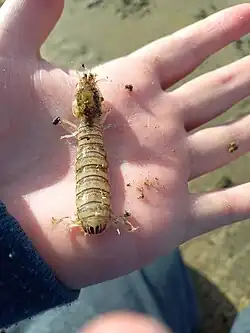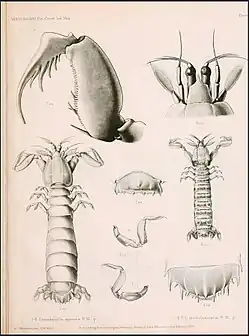Heterosquilla tricarinata
| Heterosquilla tricarinata | |
|---|---|

| |
| Scientific classification | |
| Kingdom: | Animalia |
| Phylum: | Arthropoda |
| Class: | Malacostraca |
| Order: | Stomatopoda |
| Family: | Tetrasquillidae |
| Genus: | Heterosquilla |
| Species: | H. tricarinata
|
| Binomial name | |
| Heterosquilla tricarinata (Claus, 1871)
| |
| Synonyms | |
|
Coronis spinosa Wood-Mason, 1875 Coronis tricarinata Claus, 1871 Squilla indefensa 1878 | |
Heterosquilla tricarinata is a species of mantis shrimp in the family Tetrasquillidae. It is found in both the Indo-West Pacific, Andaman Islands and throughout New Zealand.[2]
Taxonomy
This species was first described by Carl Freiedrich Wilhelm Claus, a German zoologist and anatomist, and originally Coronis tricarinata in 1871.[3][4]
Description
Heterosquilla tricarinata live in tidal mud flats creating extensive barrow systems.[5] This species of mantis shrimp is adapted for low dissolved oxygen levels in its benthic habitat.[6] The shrimp ranges from a light beige to greenish colour with the females often having a distinctive red stripe along the spine.
Distribution
Three species of Heterosquilla (H. laevis, H. koning, H. tricarinata) range throughout New Zealand, from Northland to the south, including H. tricarinata found on the Chatham Rise and the Auckland Islands.[7]
Ecology
H. tricarinata is an ambush predator with sharp pincers.[8] Benthic foraging predators prey on H. tricarinata, including the rig or spotty dogfish shark (Mustelus lenticulatus).[9]

References
- ^ Funnell, Greig; et al. (January 2023). Todd, Amanda (ed.). Conservation status of indigenous marine invertebrates in Aotearoa New Zealand, 2021 (PDF) (Report). New Zealand Department of Conservation. p. 24. ISBN 978-1-99-118365-1. Retrieved 27 September 2024.
- ^ Raymond B. Manning (1978). "New and rare stomatopod Crustacea from the Indo-West-Pacific Region" (PDF). Smithsonian Contributions to Zoology. 264 (264): 1–36. doi:10.5479/si.00810282.264.
- ^ "WoRMS - World Register of Marine Species - Heterosquilla tricarinata (Claus, 1871)". www.marinespecies.org. Retrieved 2025-08-01.
- ^ Claus, C. "Die Metamorphose der Squilliden". Abh. K. Ges. Wiss. Göttingen. 16 (1): 111–163 – via Biodiversity Heritage Library.
- ^ "Shrimp, Mantis". The Marine Life Database 2020. University of Otago. Retrieved 19 October 2024.
- ^ Innes, Alastair J (1985). "Aerobic scope for activity of the burrowing mantis shrimp Heterosquilla tricarinata at low environmental oxygen tensions". Comparative Biochemistry and Physiology Part A: Physiology. 81 (4): 827–832. doi:10.1016/0300-9629(85)90914-4.
- ^ AHYONG, S. T. (2012) The Marine Fauna of New Zealand: Mantis Shrimps (Crustacea: Stomatopoda). NIWA Biodiversity Memoir, ISSN 1174-0043; 125
- ^ "Shrimp, Mantis". The Marine Life Database 2020. University of Otago. Retrieved 19 October 2024.
- ^ King, Ken J.; Clark, Malcolm R. (March 1984). "The food of rig ( Mustelus lenticulatus ) and the relationship of feeding to reproduction and condition in Golden Bay". New Zealand Journal of Marine and Freshwater Research. 18 (1): 29–42. doi:10.1080/00288330.1984.9516026. ISSN 0028-8330.
External Links
- Heterosquilla tricarinata discussed on RNZ Critter of the Week, 11 June 2021.
